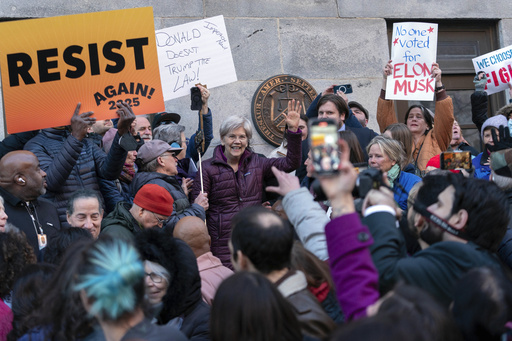
**Uncertainty Looms Amid Elon Musk’s Federal Resignation Offer**
In a scenario unfolding thousands of miles away from Elon Musk’s headquarters, a federal employee in the Pacific Northwest is contemplating resignation due to an unprecedented incentive program initiated by the Trump administration. This employee, who chose to remain anonymous to avoid potential backlash, is tempted by the offer of several months’ salary in exchange for her departure from government service. The thought of relocating abroad is appealing; however, concerns about the legitimacy of the offer linger. Could this be a ploy to identify government workers deemed disloyal?
This situation encapsulates the distress and confusion permeating the federal workforce, which employs over 2 million individuals across various occupations, including analysts, nurses, scientists, and more. A key date looms: Thursday at 11:59 p.m. EST marks the cut-off for workers to decide whether to accept the resigning incentive.
The Trump administration is actively promoting this resignation program as part of a broader initiative to restructure federal agencies and combat what they refer to as the “deep state” that allegedly challenged Trump’s previous term. Officials argue that this program represents a “once-in-a-lifetime opportunity,” aimed at reducing government size while still allowing employees to receive pay until the end of September.
As the deadline approaches, there has been increased pressure from the administration on employees to resign, with warnings about potential layoffs or furloughs on the horizon. A communication from the Office of Personnel Management, a central player in Musk’s downsizing strategy, stated that many agencies would likely be undergo structural reductions. It cautioned that those who choose to stay must demonstrate “loyalty” and face rigorous standards of conduct.
Democrats and labor unions have raised alarms about the offer, asserting it lacks Congressional authorization and carries the risk of no compensation for accepting the deal. Legal actions have been initiated to halt the resignation program, with a court hearing scheduled to address the issues surrounding it. Labor union leaders, such as Everett Kelley from the American Federation of Government Employees, advise caution, labeling the offer as dubious and urging workers not to participate.
While some employees find the pressure to sign up troubling, they are cognizant of the potential downsides, including clauses in the agreement that could forfeit the right to legal recourse if the government fails to uphold its side of the bargain. The administration has been proactive, organizing Q&A sessions to assuage worker doubts. Officials emphasize that the offer is authentic and part of a concerted effort to reform the civil service.
During discussions with staff at the Department of Agriculture, concerns were echoed regarding the uncertainty of the future. Agency leaders expressed understanding of the stress surrounding the decision-making process. Even with support and explanations from the administration, skepticism remains prevalent; many federal employees doubt the feasibility and sincerity of the offers made, with some recalling Trump’s previous disputes with contractors.
Demonstrations have erupted outside various federal buildings, signaling the anxiety within the workforce. Protesters express fear that if dissent is not voiced, the administration will replace current employees with supporters of their agenda. The perception of government jobs as stable has shifted, with employees now uneasy about their job security.
Constituents are voicing their frustration with how federal workers are perceived by society at large, reflecting on the sacrifices of those in government service. The threat of downsizing is seen as an alarming strategy, especially in fields where effective staff resources are essential, such as healthcare at the Department of Veterans Affairs. Many employees, initially inclined to take the resignation offer, are now reconsidering due to promotions and messaging that feel enticing yet too good to be true.
Irrespective of individual decisions, it is evident that the current upheaval is reshaping the dynamics of the federal workforce. The ongoing transformations bring forth a sense of unrest, contributing to the turmoil that Trump appears eager to instigate within the system.

